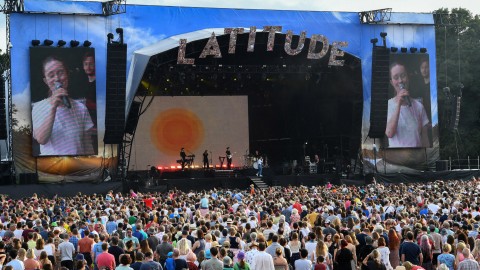
Loyle Carner has opened up about the importance of using his live shows to speak out against toxic masculinity, and recalled how he has grown since his debut album. Check out the full interview above.
The British hip-hop singer and songwriter caught up with NME on the red carpet for this year’s Mercury Prize, and looked back on his huge set at Reading & Leeds earlier this year.
Here, the shortlisted artist reflected on his performance on the main stage last month, and revealed why he devoted a large portion of the set towards counteracting harmful attitudes.
“It’s magic, man,” he began, explaining what it felt like to generate such a positive response from his live set. “I feel like the conversations I had after the show, those little bits mean the most. Like when kids go ‘Thank you’.”
Carner also recalled how someone got in touch with him after the set to tell him that his moving performance encouraged her son to come forward and start a discussion about mental health.
“I got a beautiful message from a random mum on Instagram saying that her son went through some stuff. I don’t need to disclose it, but it was the first time he was able to say to her ‘Yo, that I went through, it hurt me’,” the artist added. “I think giving kids a place to talk like that – especially young men because it wasn’t allowed when I grew up – it’s important.”

He continued: “It was funny, man, that video got posted on some Instagram [page]… and the comments on it were so toxic. Saying all this shit about me and that should just shut my mouth… it made me realise how important it is to say that [message] because those kids are just as lost as I was.”
Elsewhere in this discussion with NME, Carner also revealed how he has evolved as an artist, and noticed a change between his latest album ‘Hugo’ and his 2017 debut ‘Yesterday’s Gone’.
Both albums saw the musician shortlisted for the Mercury Prize, however, this time around he said was able to attend the ceremony with a wider sense of clarity, and able enjoy the milestone more than before.
“I guess every time you’re making an album, you’re making it in response to the one that you’ve just made before. I think that’s been true of what I’ve made up to this point,” he said. “I feel like I’m able to take myself less seriously [than in 2017, especially] when it comes to stuff like this, which means I’m able to enjoy stuff more.”
“I’m also a father now. I get less sleep — that’s how I’m different! I’m knackered all the time. That’s the real difference,” he continued, going on to share his admiration for other shortlisted artists this year.

“It’s deep, because, when I came in before, I felt like an outsider looking in, you know?
What I loved about being here last time was like feeling part of the conversation. That’s all I ever wanted, just to be in and amongst something.
“That’s deep for me because these are people I really respect — Ezra Collective, those are my guys. Olivia Dean, I love so much. Young Fathers, I never really chatted to but I’m a big fan. So to be around these people [like] Shygirl, it’s sick for me.”
Carner’s third album ‘Hugo’ arrived last October, and in a four-star review, NME described the release as “his most polished record yet”.
“Carner move[s] from dynamic, multi-syllabic storytelling to a more honest, reflective voice,” it read. “It’s personal, yet far-reaching; the rapper mourns his father, but he also mourns strangers, kids lost to violence, crime, a hostile state. He’s sorrowful, fully aware of the injustice of the world, but more at ease with his place within it.”
Elsewhere at the Mercury Prize this year, British jazz band Ezra Collective took home the coveted award – beating off competition from the likes of Raye, Young Fathers, Arctic Monkeys, Lankum, Shygirl, Jockstrap and Jessie Ware.
Speaking with NME, the band’s drummer Femi Koleoso explained what it meant for Ezra Collective to be representing the jazz community at the prestigious award ceremony, saying it was “wonderful to be a part of something so big and so special”.
The post Loyle Carner explains the importance of combating toxic masculinity with his live shows appeared first on NME.








